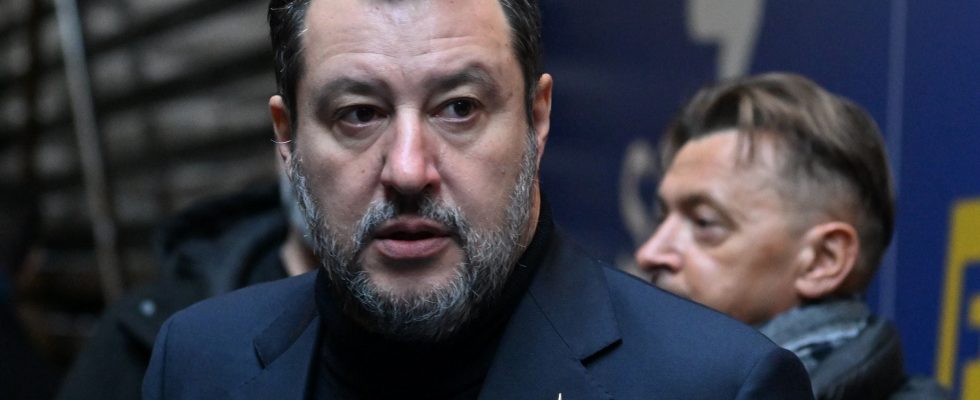The ancient Romans dreamed of it, Matteo Salvini will do it. The Italian Minister of Transport promises to inaugurate the construction site of the bridge over the Strait of Messina in the summer of 2024. Fantasized for two millennia, this project has regularly resurfaced in public debate on the peninsula for four decades. It has become the obsession of Matteo Salvini, seized by a dream of grandeur inversely proportional to the narrow space that must be filled: a little more than 3 kilometers separating the Pointe de la Botte, in Calabria, to Sicily. “It is not a simple Sicilian or Calabrian infrastructure”, this bridge “can and must be a jewel on a planetary level”, boasts the one who decided to include it in the list of priority works for Italy as part of the trans-European transport network desired by the European Union.
The Minister of the Economy, Giancarlo Giorgetti, declared that the State would invest nearly 12 billion euros in this bridge, with a first payment of 780 million this year. An envelope that has tripled since the initial estimate established nearly twenty years ago. While the first stone has still not been laid, the government of Giorgia Meloni is brushing aside fears of an explosion in costs traditionally linked to the biblical deadlines for major works in the country. We are not skimping on resources when it comes to building the largest suspension bridge in the world, with a span of 3.3 kilometers, which would beat the current record of 2.02 kilometers of the Canakkale bridge, in Turkey.
It’s not just the construction costs that make you dizzy. Overlooking the waters at a height of 74 meters, with a width of 60 meters and a weight of nearly 70,000 tonnes, the structure will house eight motorway lanes, including two for emergencies, and several railway lines. Every hour, 6,000 cars and trucks will be able to cross it, and 200 trains will use it daily.
Italy is the first beneficiary of the European recovery plan
The Eurosceptic Matteo Salvini can partly thank the generosity of the “Freemason technocrats of Brussels” whom he castigates in almost each of his public interventions a few months before the European elections. With 191.5 billion euros, Italy is the main beneficiary of the European recovery plan. Half of the resources of its National Plan for Recovery and Resilience, of more than 200 billion euros, are devoted to the construction sector, the main lever of Italian growth.
Webuild, the company which will be responsible for the work on the bridge over the Strait of Messina, assures that the construction phase alone would contribute 2.9 billion euros to the transalpine GDP and would employ 100,000 people and 300 suppliers. Its detractors point out above all that “this pharaonic project which is not essential will prevent the realization of more easily achievable and essential projects”. It will thus be possible to travel from the mainland to Sicily in less than half an hour, but in the absence of modern road and rail networks, it will still take six hours to travel the 200 kilometers that separate Palermo from Catania.
A paradox for the League
Heard in December by the parliamentary committee responsible for the budget, representatives of the National Association of Building Builders (Ance) tried to calm Matteo Salvini’s enthusiasm. More than three quarters of Italian infrastructure investments planned for the coming years will be devoted to the bridge over the Strait of Messina. Necessary work, both in the north and in the south of the country, risks being stopped or abandoned. A real paradox for Matteo Salvini’s League, which promised to get a paralyzed nation moving again and has always denounced in the past the mismanagement that this project, described as a “cathedral in the desert”, would represent. His opponents are numerous, but with each of their objections they face irony from the minister.
What about the protected maritime zone in the middle of which the bridge will be built? “He will pass above” retorts Matteo Salvini. Disturbances for the hundreds of thousands of migratory birds between Africa and Europe? “They will take another path,” replies the one who does not even allow himself to be disturbed by the concern of the geologists. This area is highly seismic and a devastating earthquake is feared in the coming decades. “The bridge will be ready to face a 7.5 magnitude earthquake,” annoys the far-right leader. The mafia threat hovering over a construction site linking the stronghold of the Sicilian Cosa Nostra to that of the Calabrian ‘Ndrangheta only causes him to shrug his shoulders. “I am not afraid of criminal infiltration, boasts the former Minister of the Interior. There will be control bodies – on which we are already working – for each euro invested on the bridge.”
There remains the question of the deadlines for a project which should last – if all goes well – six years. Federica Brancaccio, the president of ANCE, repeats that the priority must remain the implementation of the European recovery plan which is already showing “irrecoverable delays”, according to the Meloni government’s own admission. “We are worried,” she said. “We must not miss this great opportunity to become a modern country. At least a quarter of the staff in local administrations has disappeared in recent years.”
The Italian Court of Auditors also confirms its serious doubts about compliance with deadlines. “We must remain attentive to the difficulty of recruiting qualified personnel to complete the projects that have been launched,” financial magistrates were recently alarmed in a report on the progress of the recovery plan. They also highlighted the delays caused by the lack of consultation between the different administrations involved. “It is necessary to strengthen them, in particular with technicians prepared to overcome the significant difficulties in spending the allocated resources and carrying out effective controls,” insisted the Court of Auditors. Matteo Salvini’s dream of grandeur could well prove to be a nightmare for Italy.
.
